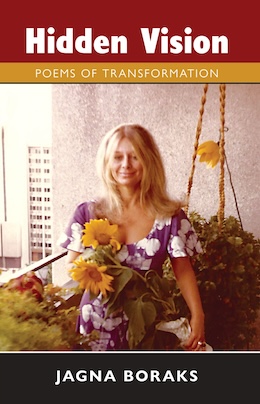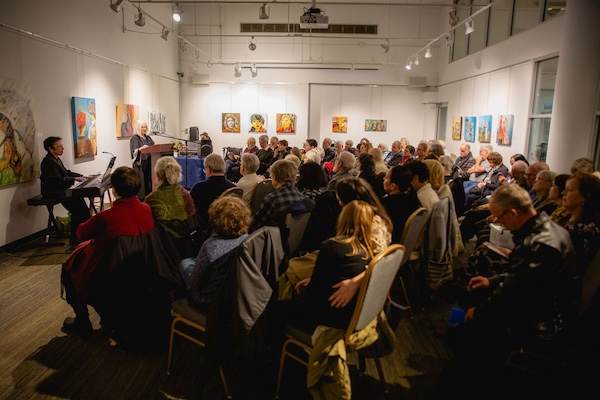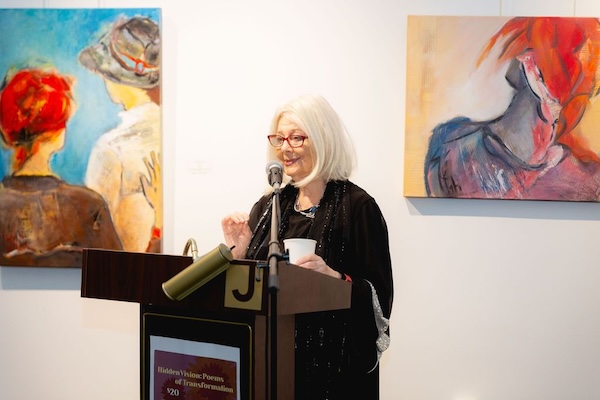Lillian Boraks-Nemetz speaks at the Nov. 24 launch of her latest book, Hidden Vision: Poems of Transformation, which she wrote under the name Jagna Boraks. (photo by Rhonda Dent)
Lillian Boraks-Nemetz launched her latest book, Hidden Vision: Poems of Transformation, written under the name Jagna Boraks, at the Sidney and Gertrude Zack Gallery Nov. 24. Co-presented by the Vancouver Holocaust Education Centre and the JCC Jewish Book Festival, the event featured Boraks-Nemetz sharing some of her poems – on themes of identity, resilience and remembrance – with musical accompaniment by Wendy Bross Stuart.
Divided into six sections, the poems in Hidden Vision travel from the Holocaust to after the pandemic, from a nadir of human experience to a zenith of hope and gratitude.
 In her introduction, composed shortly after the Oct. 7 Hamas attacks, Boraks writes, “Destruction is the opposite of creation. To survive in this world, in any crisis or situation, we need to strengthen ourselves and each other – spiritually. We begin by respecting ourselves and others.
In her introduction, composed shortly after the Oct. 7 Hamas attacks, Boraks writes, “Destruction is the opposite of creation. To survive in this world, in any crisis or situation, we need to strengthen ourselves and each other – spiritually. We begin by respecting ourselves and others.
“Understanding that each human life matters, and that each culture and creed are all a part of the world’s flowing river. There is greater strength in this belief than hatred and intolerance.”
The book begins in the spring of 2020, when the world was in the throes of COVID-19 and all that it brought – isolation, fright, shifts in personal and professional behaviour, and, of course, widespread sickness. In the poem “My Street,” written on March 29, 2020, Boraks confronts these issues:
“I will not wait like the brides / I will unlock my door and step outside / where the air feels fresh and crisp / breathing deeply I will begin my walk / towards life.”
Further on, she looks towards her literary influences, one of whom is Adam Mickiewicz, regarded by many as the national poet of Poland, but who also had an impact on the literature of neighbouring countries. In “The Autumn Muse,” inspired by Mickiewicz, Boraks asks: “has anyone ever written an ode / to old age – when the bird of youth / becomes time’s vulture / lurking in mid-air / its malevolent claws seeking to destroy?”
Within the later sets of poems, there is a poignant tribute to Alex Buckman, who, like Boraks-Nemetz, had been an ardent campaigner for Holocaust education in British Columbia. Buckman passed away in Warsaw in 2023 while on a March of the Living trip, where he served as a mentor to young students. In a tribute titled “In Memoriam for a Friend,” Boraks writes: “you chanted your life’s song / like the thorn bird / which sings till his heart might break / you chanted your fear of the dark / as you sang to the children / to appease their fear / as you sang to the students / to teach them lessons / of those barbaric times / when human life was cheap.…”
Despite countless social ills, personal struggles and humankind’s propensity for cruelty, Boraks ends the compilation on an upbeat note. For example, her poem “Hope” reads: “but father time in tune with God / will move the frozen earth into the sun / there – flooded by the light / a new earth will bear fruit / a new man woman and child / will behold the magic of a spring day.”

Born in Warsaw, Boraks-Nemetz is a child survivor of the Holocaust. She lived in and escaped the Warsaw Ghetto, then hid in Polish villages under a false identity. Her family came to Canada in 1949.
Boraks-Nemetz graduated from St. Margaret’s School in Victoria, going on to study at the University of British Columbia, where she earned a bachelor of arts, then a master’s in comparative literature. Upon earning a certificate in ESL from George Brown College, she taught English, before eventually teaching creative writing at UBC’s Writing Centre, from 1980 until 2015.
Boraks-Nemetz’s previous volumes of poetry are Out of the Dark, Garden of Steel and Ghost Children. She has also penned three award-winning young adult novels: The Old Brown Suitcase, Sunflower Diary and The Lenski File. The Old Brown Suitcase was placed on the recommended reading list for BC schools.
In 2017, Boraks-Nemetz published Mouth of Truth, a novel exploring a family’s past and the trauma of the Holocaust. She has also translated the works of Polish poets Andrzej Busza (Astrologer in the Underground) and Waclaw Iwaniuk (Dark Times).
To order Hidden Vision, contact the Vancouver Holocaust Education Centre at [email protected] and 604-264-0499.
Sam Margolis has written for the Globe and Mail, the National Post, UPI and MSNBC.

